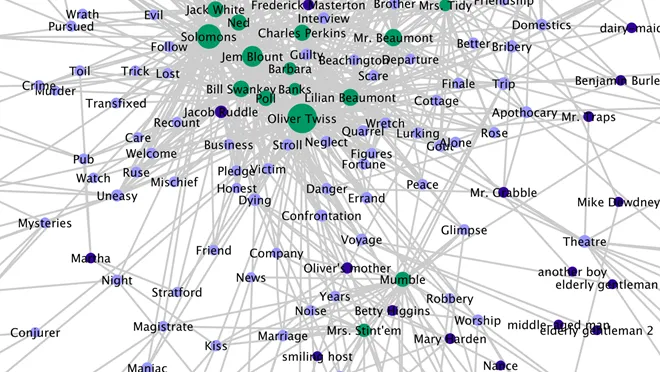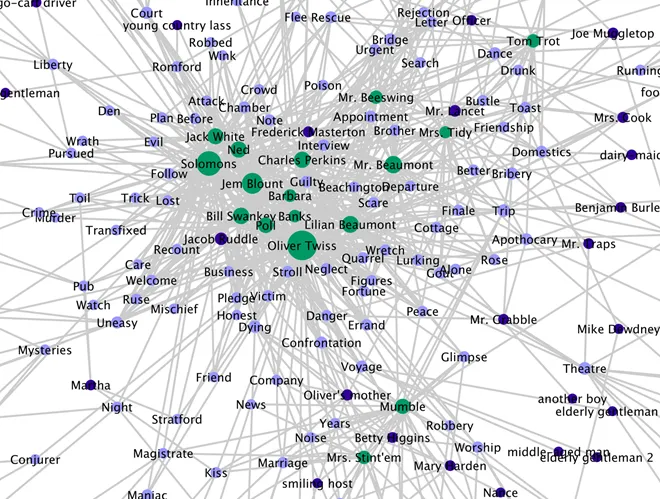Networking Connections in Victorian Novels
6 November 2022
CDH Dissertation Prize co-winner Kristen Starkowski *21 used social network analysis to learn more about novels by Charles Dickens and Victorian penny serialists.

Every year, the Center for Digital Humanities recognizes exceptional doctoral work by Princeton PhDs whose dissertation includes a digital humanities component. The co-winner of the 2021 CDH Dissertation Prize is Kristen Starkowski *21 (English).
In her dissertation, Doorstep Moments: Close Encounters with Minor Characters in the Victorian Novel, Kristen introduced a concept she calls “the doorstep” to “describe moments when readers catch slight and brief glimpses of underwritten story worlds in the novel.”

Kristen is one of two co-winners of the 2021 CDH Dissertation Prize.
Kristen was motivated by multiple questions. She was especially interested in answering three questions to understand the relation between literary character and novel form.
“First,” she said, “I asked who counts as a minor character? Second, what is unique about minor characters in nineteenth-century British fiction? And third, does character position align with theories of the minor in nineteenth-century society?”
Part of her theoretical work involved the work of sociologist Erving Goffman, who, as Kristen explained, “sees figures on the edges of the social world as central to everyday reality—even though his subjects were real people, not fictional characters.”
In Kristen’s case, she used Goffman’s theories to explore the relationships of so-called “minor” characters in Victorian novels and the spaces they occupied in the narratives. In her analysis of these characters, Kristen found connections “between the characters pushed to the edges of these crowded fictional worlds and gender, working-class status, vagrancy, and disability.”
One of Kristen’s chapters included an analysis of novels by Victorian penny serialists, such as Edward Lloyd, George W.M. Reynolds, and Thomas Peckett Prest, who published works with similar-sounding names and characters to Charles Dickens’s novels. For example, Kristen explained, “The Pickwick Papers became The Penny Pickwick, Oliver Twist became Oliver Twiss, and Nicholas Nickleby became Nikelas Nickelbery.”
She noticed that while the hack writers had “adapted Dickens’s characters and titles, they also took the stories in new directions, particularly in terms of character.” A minor character in one of Dickens’s novels would become a major character in one of the spinoffs, for example.
With so many characters and relationships to keep track of, Kristen realized that she needed to turn to the digital humanities to help her make sense of the networks of relationships within each of the novels. She turned to social network analysis to help “quantify and visualize the observations and instincts I had about character position in Dickens’s novels compared to those published by his penny rivals.” She decided to apply to become a CDH Graduate Fellow to help her answer her research questions and map out the character networks she was discovering.
Kristen used the open-source software platform Cytoscape to visualize the network systems within the different Victorian novels. Cytoscape allowed her to “model the proportion of character space that minor characters received in different novels.”

In this network, major characters are shown in green, minor characters are shown in dark purple, and the scenes that connect characters are shown in light purple. A larger circle means that a character is connected to more scenes in the novel, relative to all of the other characters. Read more on the Victorian Review blog.
“Using DH helped me change the conversation around character systems in the realist novel,” Kristen said. “Network analysis helped me show that connections matter as much as page space. I found that whether characters are major or minor has as much to do with their connections to other characters as it does with their presence on a specific number of pages.”
Kristen compiled her findings of this chapter in a journal article, “‘Our Delectable Works’: Characterological Novelty in Penny ‘Plagiarisms’ of Oliver Twist” in the Victorian Review. Although DH was focused on one specific chapter, Kristen said that using DH in this chapter helped her to “think of the stakes of my whole dissertation argument.”
CDH Faculty Director Meredith Martin, who served as one of Kristen’s advisors, was impressed by both the amount of data work and archival work Kristen employed in her dissertation. In recommending Kristen for the dissertation prize, she applauded Kristen’s willingness to try different methods to help her understand her materials in a new light.
“Kristen’s ability to use the affordances of network analysis to make a larger claim about the work of minor characters was one of many methodologies used in her dissertation,” she said. “Kristen’s use of network analysis was part of a larger argument and was not the only method she employed, but it was the right method for that question, and she integrated it into the project beautifully.”
Kristen now teaches Expository Writing at Harvard College Writing Program, where she teaches the tools of digital humanities to her composition students. “I’ve become fascinated by the ways that we can bring digital humanities into composition studies, and the ways that we can use digital tools in our teaching,” she said. For example, network analysis (the tool which was instrumental to her own dissertation), can “help students map out ideas, or textual analysis programs can help students understand their own writing and their word choices at a deeper level.”
To other students considering using DH in their dissertation projects, Kristen encouraged using DH methods to help answer their research questions. DH skills, Kristen said, are “useful beyond the dissertation: in teaching and in a variety of research projects. You never know when you might need them in the future!”
Read about CDH Dissertation Prize co-winner Lizabel Mónica *22 on the blog next Monday.